parasite support
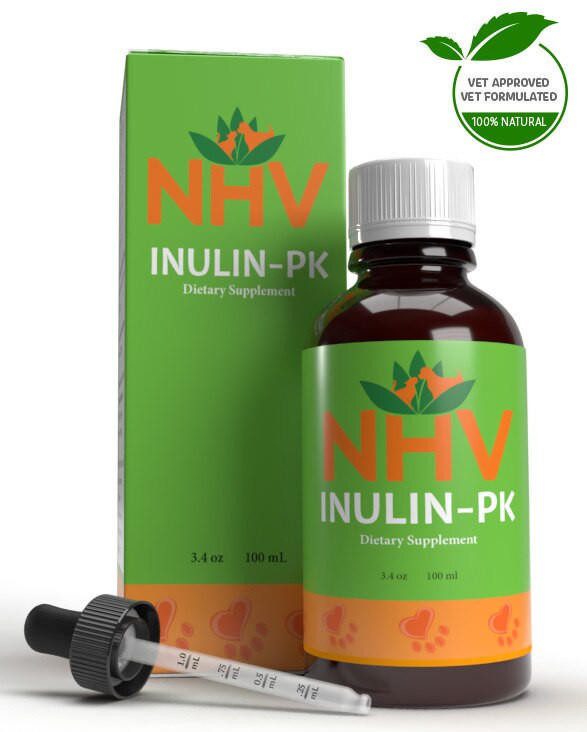
free shipping over $100 (USA & Canada)
1-877-937-4372 the pet expert hotline
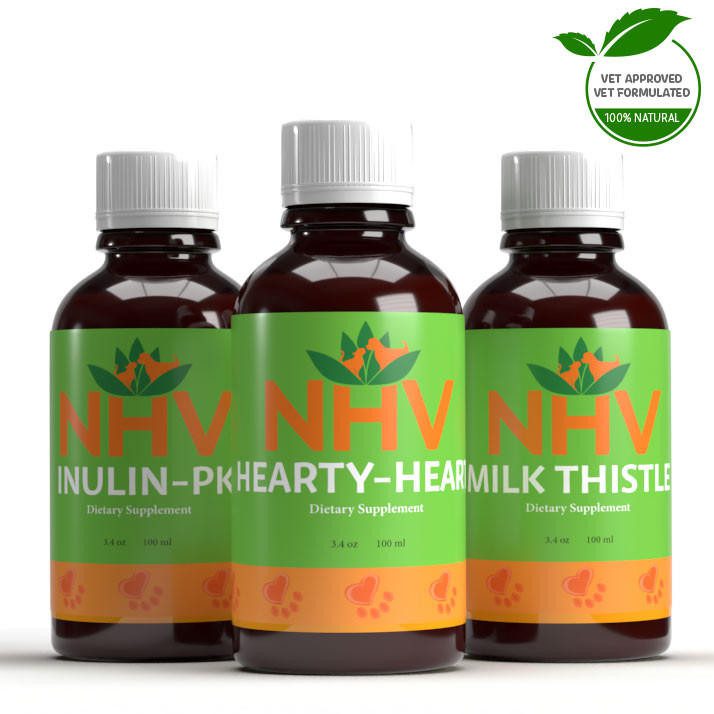
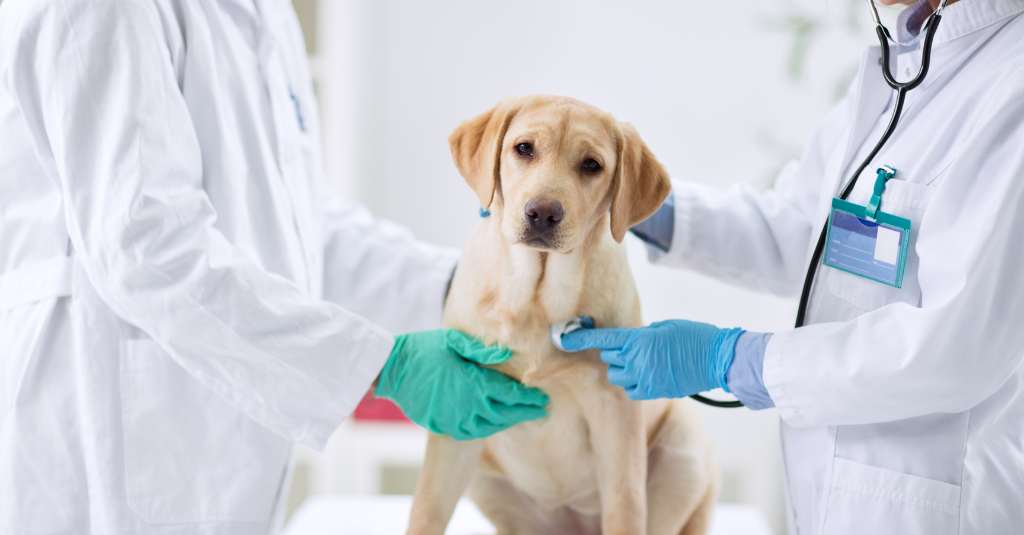
Heartworm disease in pets can be very concerning for pet parents. The invasion of this mosquito-borne parasite can be life-threatening for your little one in severe cases! So it is essential to take steps to protect them from the disease.

Heartworms require mosquitos to complete their lifecycle. Infected animals harbor microscopic baby worms (microfilaria) that mosquitos pick up during a blood meal. These larvae mature inside the mosquito and enter a new animal through another bite. Six months later, they transform into adult heartworms that reside in the heart, lungs, and blood vessels, causing significant damage over time.
Early detection is crucial. While initial symptoms may be mild (cough, occasional panting), as the infection progresses, pets might exhibit decreased appetite, weight loss, exercise intolerance, and eventually, heart failure. A heavy worm burden can block blood flow, leading to life-threatening situations.
A heavy worm burden can block blood flow, leading to life-threatening situations.
The risk of heartworm infection varies depending on the activity of mosquito vectors, with higher prevalence in humid and warm areas like the southern regions of the United States and tropical climates. Despite the disease not being widespread, all pets spending time outdoors are susceptible to infection, including indoor pets that may still encounter mosquitoes. That’s why it’s crucial to take preventive measures to safeguard your pet’s health.
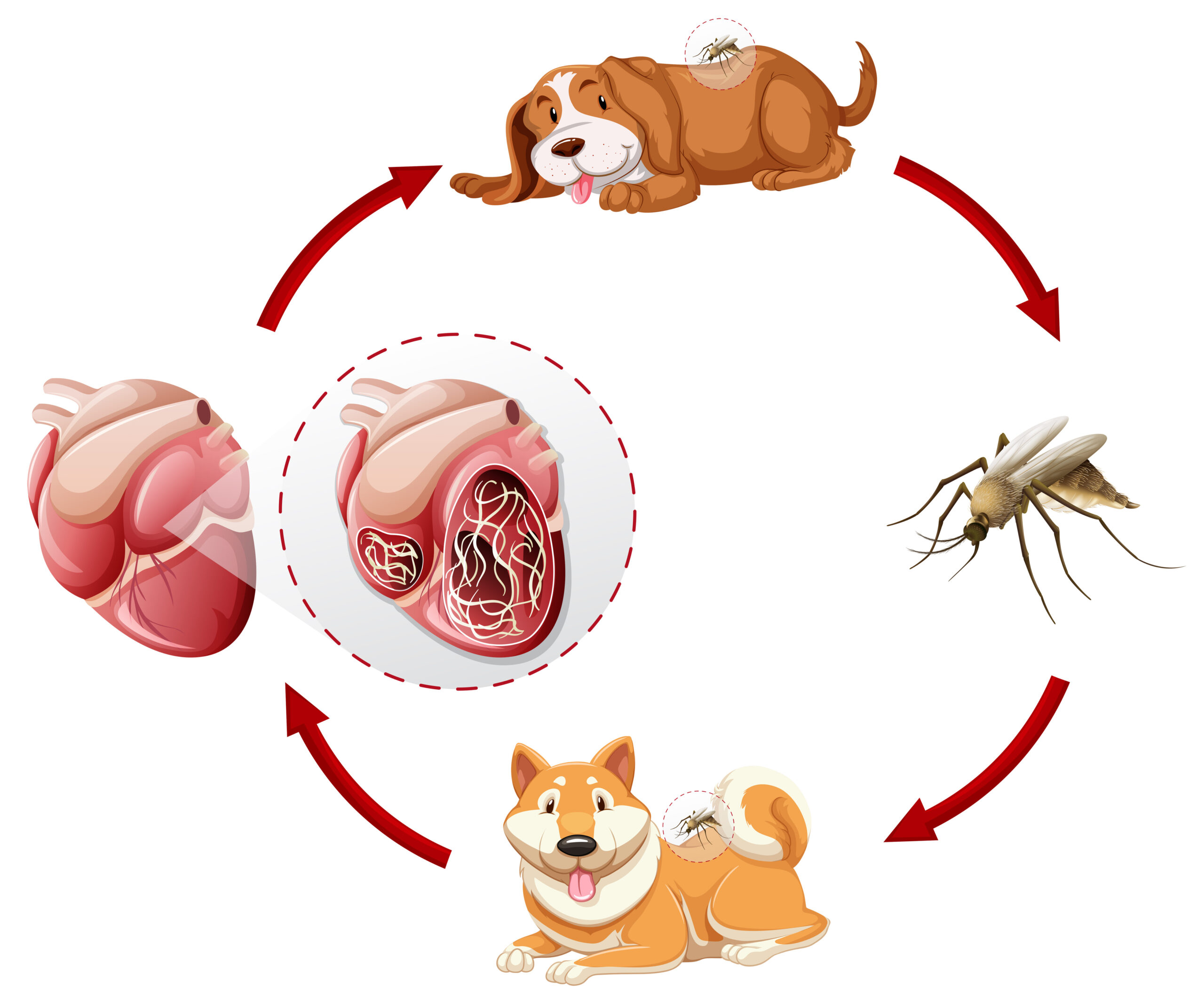
Fortunately, heartworm disease in pets is preventable. Various forms of medication are available, including injections, chewable tablets, and topical spot-on treatments. Consult your veterinarian to determine the most suitable option for your pet. Generally, pups can begin prevention as early as 6 weeks old.
Annual testing is recommended even for pets on preventive medication. If your furkid tests positive, treatment will depend on the severity of the infection. Mild cases can be managed with medication, while severe cases might require surgical removal of adult worms. These treatments can be stressful on your pet’s body. Consider veterinarian-recommended supplements like NHV Hearty-Heart, NHV Turmeric, NHV PetOmega3, and NHV Milk Thistle to support their heart, immune system, and overall well-being during recovery.
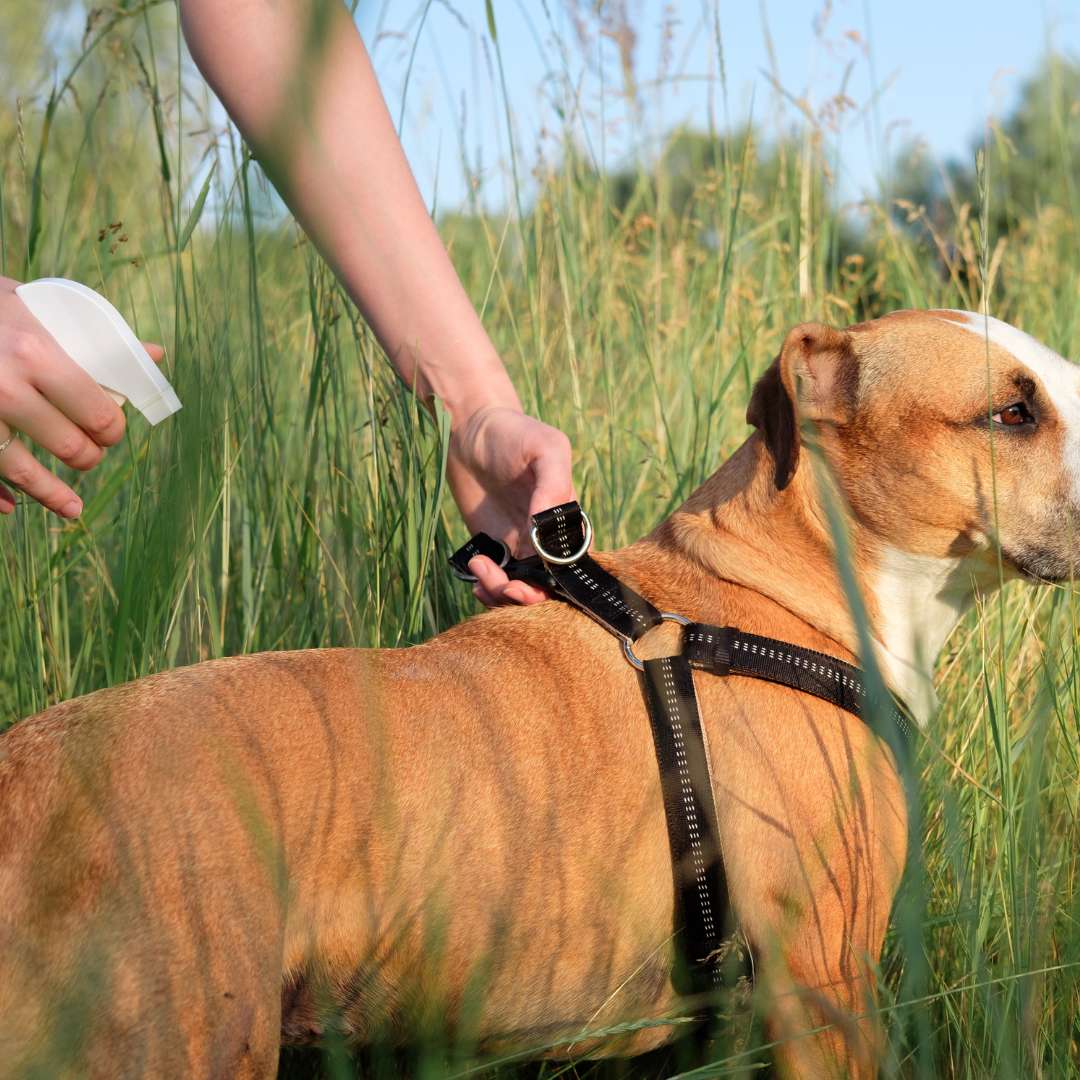
Here are some practical tips to safeguard your pet:
Proactive prevention is the cornerstone of protecting your pet from heartworm disease. Consult your veterinarian before starting any preventative medication, especially for Collie and Shepherd breeds as some medications might not be suitable. Schedule regular check-ups and consider veterinarian-approved supplements to support your pet’s overall health. Remember, a happy and healthy pet is a pet protected from preventable diseases like heartworm disease!
parasite support

Natural Dog Worms Remedy and Dewormer
buy 2 and save $3
3 month supply for a small to medium size pet
Inulin-PK works as a natural dog worms remedy and parasite cleanser. Prevent parasitic infections and help your hound heal with a holistic dog dewormer remedy from NHV.

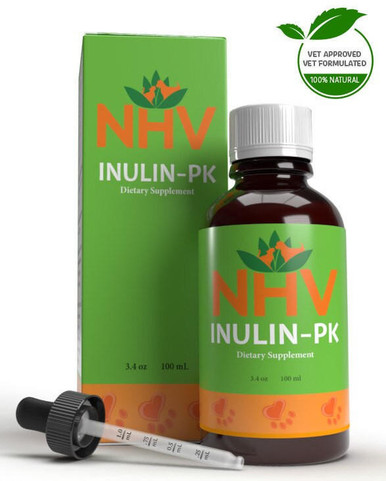
Inulin-PK works as a natural dog worms remedy and parasite cleanser. Prevent parasitic infections and help your hound heal with a holistic dog dewormer remedy from NHV.

Parasites aren’t just annoying pests plaguing your pet. Left to their own devices, parasites can lead to serious health issues. They make it harder for dogs to absorb nutrients from their food, damage their intestines, and sap your pup’s energy. You might also see weight loss, anemia, or diarrhea in a pet with parasites.
Roundworms, tapeworms, hookworms, whipworms, and threadworms are all types of parasites that Inulin-PK can (help) expel from your pet’s body naturally. Consider this worms remedy for dogs in addition to the treatment prescribed by your vet. Natural dog dewormer remedies like Inulin-PK can also help improve your pet’s immunity to prevent future infections.
Inulin-PK is a powerful parasite & infection-fighting aid. It contains plant extracts that specifically target canine parasites.
Our dog worm remedy is formulated with ingredients like elecampane that paralyzes worms’ central nervous system, Papaya to help dissolve worms’ outer layers, Bacopa with strong anti-inflammatory properties, and Jamaica Quassia to help flush parasites out of your dog’s body.
For additional comprehensive care, see our collection of effective kits containing natural dog deworming remedies.
NHV makes significant annual investments in clinical research to make sure our natural pet products are supported by recent clinical results. For more information on what NHV is doing to ensure quality solutions for your pet’s health issues, call our pet expert hotline at 1-877-937-4372.
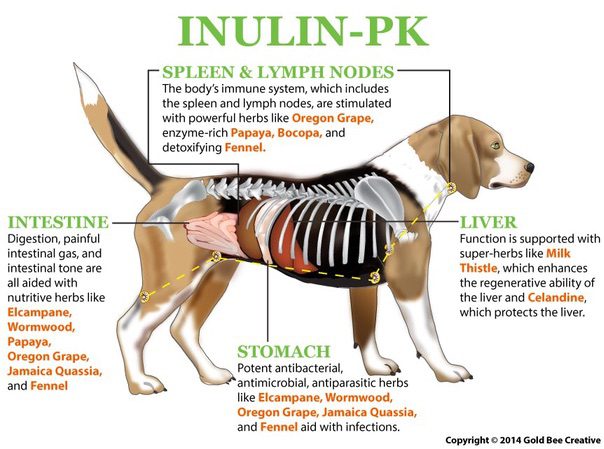
Elecampane – Paralyzes the central nervous systems of worms
Wormwood – Eliminates intestinal worms and fights parasitic infestations
Jamaica Quassia – Eliminates parasitic worms from the body
Papaya – Dissolves the worm’s outer layer and weakens its defenses
Oregon Grape – Contains antibiotic and immunostimulatory properties, relieves indigestion, and improves nutrient absorption
Fennel – Decreases digestive problems and calms spasms
Bacopa – Contains anti-inflammatory properties, eliminates toxins, and promotes healing
Milk Thistle – Protects and strengthens liver function and stimulates new cell growth in the liver
Celandine – Protects the liver, improves the flow of bile to the liver, and emulsifies gallbladder content
Select your pet's weight to determine the correct dose.
To be taken twice daily. Determine your pet’s weight and then use the easy chart below to determine the correct dose. This is the minimum dosage.
Pet's Weight Dosage
0 - 15 lb = 0.5 ml
16 - 30 lb = 1.0 ml
31 - 45 lb = 1.5 ml
46 - 60 lb = 2.0 ml
61 - 75 lb = 2.5 ml
Over 75 lb = 3.0 ml
For small animals (rabbits, ferrets), avians and reptiles use 1 drop for every 2 lb of body weight.
How to Administer
Shake well before use.
The easiest method is to use the dropper provide and places the drops into your pet’s food or favorite treat. You can also use the dropper and squirt directly into the pet’s mouth.
Some pets can be finicky, if this occurs consider hiding the drops in foods most pet’s love such as fish, chicken or yogurt or a favourite treat. If your pet only eats dry food then soak a few kibbles at feeding time.
For Best Results
Herbal dietary supplements are beneficial to the health and wellbeing of your pet and are safe for long-term use. Every pet responds to natural herbal supplements differently, therefore it is important to be consistent and administer the product daily. Supplements generally take two to four weeks to take effect, however this will vary from one animal to the next.
Product Storage
All NHV Natural Pet Products are pure herbal extracts and contain no artificial additives, preservatives or coloring. Shelf life after opening is 6 months and must be refrigerated after opening.
Cautions and Contraindications
Do not use Inulin-PK in pregnant animals.
Speak to your vet before using our products. A second visit is recommended if your pet’s condition does not improve, or deteriorates after continued use of the supplements.
All information provided by NHV Natural Pet Products is for educational purposes only.
Parasites aren’t just annoying pests plaguing your pet. Left to their own devices, parasites can lead to serious health issues. They make it harder for dogs to absorb nutrients from their food, damage their intestines, and sap your pup’s energy. You might also see weight loss, anemia, or diarrhea in a pet with parasites.
Roundworms, tapeworms, hookworms, whipworms, and threadworms are all types of parasites that Inulin-PK can (help) expel from your pet’s body naturally. Consider this worms remedy for dogs in addition to the treatment prescribed by your vet. Natural dog dewormer remedies like Inulin-PK can also help improve your pet’s immunity to prevent future infections.
Inulin-PK is a powerful parasite & infection-fighting aid. It contains plant extracts that specifically target canine parasites.
Our dog worm remedy is formulated with ingredients like elecampane that paralyzes worms’ central nervous system, Papaya to help dissolve worms’ outer layers, Bacopa with strong anti-inflammatory properties, and Jamaica Quassia to help flush parasites out of your dog’s body.
For additional comprehensive care, see our collection of effective kits containing natural dog deworming remedies.
NHV makes significant annual investments in clinical research to make sure our natural pet products are supported by recent clinical results. For more information on what NHV is doing to ensure quality solutions for your pet’s health issues, call our pet expert hotline at 1-877-937-4372.

Elecampane – Paralyzes the central nervous systems of worms
Wormwood – Eliminates intestinal worms and fights parasitic infestations
Jamaica Quassia – Eliminates parasitic worms from the body
Papaya – Dissolves the worm’s outer layer and weakens its defenses
Oregon Grape – Contains antibiotic and immunostimulatory properties, relieves indigestion, and improves nutrient absorption
Fennel – Decreases digestive problems and calms spasms
Bacopa – Contains anti-inflammatory properties, eliminates toxins, and promotes healing
Milk Thistle – Protects and strengthens liver function and stimulates new cell growth in the liver
Celandine – Protects the liver, improves the flow of bile to the liver, and emulsifies gallbladder content
Select your pet's weight to determine the correct dose.
To be taken twice daily. Determine your pet’s weight and then use the easy chart below to determine the correct dose. This is the minimum dosage.
Pet's Weight Dosage
0 - 15 lb = 0.5 ml
16 - 30 lb = 1.0 ml
31 - 45 lb = 1.5 ml
46 - 60 lb = 2.0 ml
61 - 75 lb = 2.5 ml
Over 75 lb = 3.0 ml
For small animals (rabbits, ferrets), avians and reptiles use 1 drop for every 2 lb of body weight.
How to Administer
Shake well before use.
The easiest method is to use the dropper provide and places the drops into your pet’s food or favorite treat. You can also use the dropper and squirt directly into the pet’s mouth.
Some pets can be finicky, if this occurs consider hiding the drops in foods most pet’s love such as fish, chicken or yogurt or a favourite treat. If your pet only eats dry food then soak a few kibbles at feeding time.
For Best Results
Herbal dietary supplements are beneficial to the health and wellbeing of your pet and are safe for long-term use. Every pet responds to natural herbal supplements differently, therefore it is important to be consistent and administer the product daily. Supplements generally take two to four weeks to take effect, however this will vary from one animal to the next.
Product Storage
All NHV Natural Pet Products are pure herbal extracts and contain no artificial additives, preservatives or coloring. Shelf life after opening is 6 months and must be refrigerated after opening.
Cautions and Contraindications
Do not use Inulin-PK in pregnant animals.
Speak to your vet before using our products. A second visit is recommended if your pet’s condition does not improve, or deteriorates after continued use of the supplements.
All information provided by NHV Natural Pet Products is for educational purposes only.
heart support
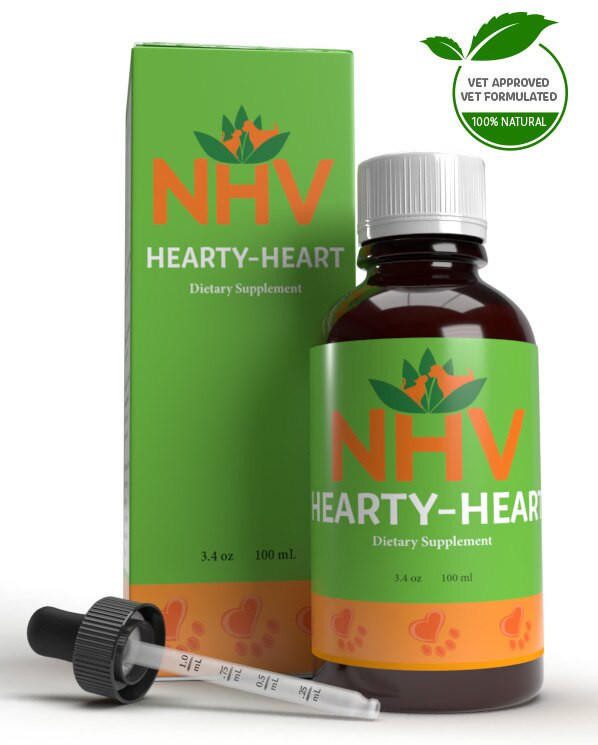
Herbal Supplement that Supports Cat Heart Disease
buy 2 and save $3
3 month supply for a small to medium size pet.
Vet-formulated natural herbal pet supplement that helps support feline heart conditions, cardiovascular disorders, cardiomyopathy, heart function, and overall heart health in cats.

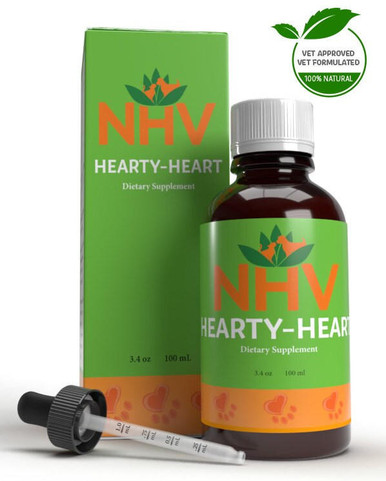
Vet-formulated natural herbal pet supplement that helps support feline heart conditions, cardiovascular disorders, cardiomyopathy, heart function, and overall heart health in cats.

NHV Hearty-Heart is a gentle, yet powerful supplement made from a unique blend of herbs that provide support for cats with heart disease. This vet-formulated natural remedy acts as a cardiovascular tonic without over stimulating the heart and may help your feline better cope with heart conditions. Try NHV supplements to help keep your kitty young at heart!
Symptoms of Heart Disease
The most common form of cat heart disease is cardiomyopathy, a condition that occurs when blood flow is restricted, or when the heart becomes weak. Watch for signs of cat heart disease including coughing, shortness of breath, wheezing, fainting, or panting after a minimal amount of exertion. Swollen limbs or dragging of a hind leg are also symptoms that may be related to your pet’s heart function.
Support your Cat with Natural Remedies
NHV’s Hearty-Heart can be taken alone, or alongside medicine prescribed by a veterinarian. It’s also safe to take long-term. Combine this supplement with proper diet and exercise to comprehensively support your pet’s health during their cat heart disease treatment regimen.
It is always advisable to talk to your vet about any concerns you may have. We also welcome you to consult our Pet Expert Q&A or call our pet expert hotline at 1-877-937-4372.
Pet Expert Tip For Heart Disease In Cats
Dr. Hillary Cook, DVM, CVA and holistic veterinary partner at NHV says that optimal weight maintenance is probably one of the most important goals that pet parents should work toward in managing cardiac disease in their pets.
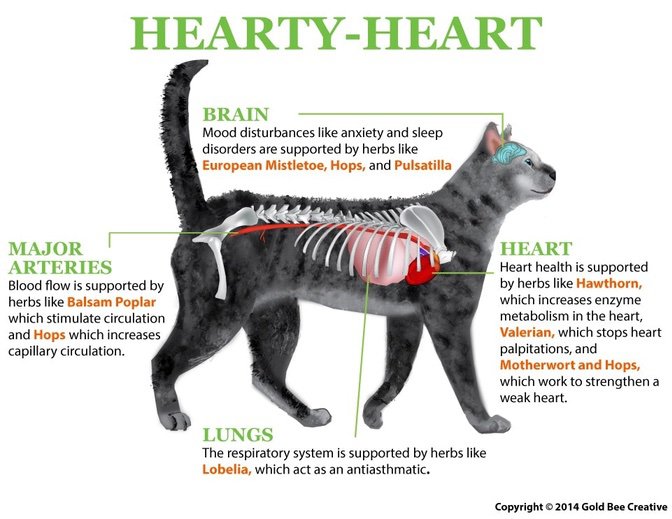
Hawthorne – Is considered to be one of the best herbs for fortifying the heart and supporting your veterinarian’s recommended cat heart disease treatment. Hawthorn acts as a cardiotonic, which helps stabilize the heart’s activity based on what the feline heart needs; either to be stimulated or reduce activity. Hawthorn has traditionally been used for heart failure, heart palpitations, heart weakness, and for the circulatory system. Hawthorne works by dilating the vessels and the coronary arteries, which improves the metabolic process and the blood supply to the heart and the rest of the cat’s body. It helps regulate your cat’s heart rate, coronary flow, and blood pressure. Hawthorne also has a soothing and sedative effect, which helps reduce stress.
Balsam Poplar – Stimulates circulation and supports blood flow. Balsam Poplar has been popular, historically, amongst the indigenous population in North America for coughs. It’s also been used as food for horses. Balsam Poplar has strong anti-inflammatory and may help with discomfort.
Hops – Helps relax tension and anxiety while supporting circulation.
Valerian – Helps manage heart palpitations and regulates the nervous system. Valerian plays a vital role in the nervous system by gently calming the nerves, which helps a cat's body to physically relax.
Woody Betony – This herb is one of the most valued in herbal medicine and has been used for centuries for over forty ailments! It acts as a mild stimulant to the heart. It is a nerve tonic that nourishes and builds vital energy. Woody Betony contains glycosides, which may help reduce blood pressure in cats, aiding in cat heart disease treatment.
Lobelia – Causes immediate relaxation and expansion of the respiratory system that allows oxygenated blood to flow freely. It helps with circulation and reduces agitation in cats.
European Mistletoe – Helps control tachycardia, relaxes spasms and hypertension. A cardiotonic that has been used for centuries.
Motherwort – Has a strengthening effect, especially on a weak heart. It helps sooth and relaxes the heart muscle. Motherwort helps maintain a regular heartbeat and lowers blood pressure, stress, and anxiety.
Pulsatilla – This herb is known to be antispasmodic, which is considered to be beneficial in cat heart disease treatment by relaxing the heart muscle and helping to soothe and relieve coughing. Pulsatilla also has a sedative effect that helps ease coughing.
Select your pet's weight to determine the correct dose.
To be taken twice daily. Determine your pet’s weight and then use the easy chart below to determine the correct dose. This is the minimum dosage.
Pet's Weight Dosage
0 - 15 lb = 0.5 ml
16 - 30 lb = 1.0 ml
31 - 45 lb = 1.5 ml
46 - 60 lb = 2.0 ml
61 - 75 lb = 2.5 ml
Over 75 lb = 3.0 ml
How to Administer
Shake well before use. The easiest method is to use the dropper provide and places the drops into your pet’s food or favorite treat. You can also use the dropper and squirt directly into the pet’s mouth.
Some pets can be finicky, if this occurs consider hiding the drops in foods most pet’s love such as fish, chicken or yogurt or a favourite treat. If your pet only eats dry food then soak a few kibbles at feeding time.
For Best Results
Herbal dietary supplements are beneficial to the health and wellbeing of your pet and are safe for long-term use. Every pet responds to natural herbal supplements differently, therefore it is important to be consistent and administer the product daily. Supplements generally take two to four weeks to take effect, however this will vary from one animal to the next.
Product Storage
All NHV Natural Pet Products are pure herbal extracts and contain no artificial additives, preservatives or coloring. Shelf life after opening is 6 months and must be refrigerated after opening.
Cautions and Contraindications
Do not use Hearty-Heart in pregnant or nursing animals. Speak to your vet before using our products. A second visit is recommended if your pet’s condition does not improve, or deteriorates after continued use of the supplements.
All information provided by NHV Natural Pet Products is for educational purposes only.
NHV Hearty-Heart is a gentle, yet powerful supplement made from a unique blend of herbs that provide support for cats with heart disease. This vet-formulated natural remedy acts as a cardiovascular tonic without over stimulating the heart and may help your feline better cope with heart conditions. Try NHV supplements to help keep your kitty young at heart!
Symptoms of Heart Disease
The most common form of cat heart disease is cardiomyopathy, a condition that occurs when blood flow is restricted, or when the heart becomes weak. Watch for signs of cat heart disease including coughing, shortness of breath, wheezing, fainting, or panting after a minimal amount of exertion. Swollen limbs or dragging of a hind leg are also symptoms that may be related to your pet’s heart function.
Support your Cat with Natural Remedies
NHV’s Hearty-Heart can be taken alone, or alongside medicine prescribed by a veterinarian. It’s also safe to take long-term. Combine this supplement with proper diet and exercise to comprehensively support your pet’s health during their cat heart disease treatment regimen.
It is always advisable to talk to your vet about any concerns you may have. We also welcome you to consult our Pet Expert Q&A or call our pet expert hotline at 1-877-937-4372.
Pet Expert Tip For Heart Disease In Cats
Dr. Hillary Cook, DVM, CVA and holistic veterinary partner at NHV says that optimal weight maintenance is probably one of the most important goals that pet parents should work toward in managing cardiac disease in their pets.

Hawthorne – Is considered to be one of the best herbs for fortifying the heart and supporting your veterinarian’s recommended cat heart disease treatment. Hawthorn acts as a cardiotonic, which helps stabilize the heart’s activity based on what the feline heart needs; either to be stimulated or reduce activity. Hawthorn has traditionally been used for heart failure, heart palpitations, heart weakness, and for the circulatory system. Hawthorne works by dilating the vessels and the coronary arteries, which improves the metabolic process and the blood supply to the heart and the rest of the cat’s body. It helps regulate your cat’s heart rate, coronary flow, and blood pressure. Hawthorne also has a soothing and sedative effect, which helps reduce stress.
Balsam Poplar – Stimulates circulation and supports blood flow. Balsam Poplar has been popular, historically, amongst the indigenous population in North America for coughs. It’s also been used as food for horses. Balsam Poplar has strong anti-inflammatory and may help with discomfort.
Hops – Helps relax tension and anxiety while supporting circulation.
Valerian – Helps manage heart palpitations and regulates the nervous system. Valerian plays a vital role in the nervous system by gently calming the nerves, which helps a cat's body to physically relax.
Woody Betony – This herb is one of the most valued in herbal medicine and has been used for centuries for over forty ailments! It acts as a mild stimulant to the heart. It is a nerve tonic that nourishes and builds vital energy. Woody Betony contains glycosides, which may help reduce blood pressure in cats, aiding in cat heart disease treatment.
Lobelia – Causes immediate relaxation and expansion of the respiratory system that allows oxygenated blood to flow freely. It helps with circulation and reduces agitation in cats.
European Mistletoe – Helps control tachycardia, relaxes spasms and hypertension. A cardiotonic that has been used for centuries.
Motherwort – Has a strengthening effect, especially on a weak heart. It helps sooth and relaxes the heart muscle. Motherwort helps maintain a regular heartbeat and lowers blood pressure, stress, and anxiety.
Pulsatilla – This herb is known to be antispasmodic, which is considered to be beneficial in cat heart disease treatment by relaxing the heart muscle and helping to soothe and relieve coughing. Pulsatilla also has a sedative effect that helps ease coughing.
Select your pet's weight to determine the correct dose.
To be taken twice daily. Determine your pet’s weight and then use the easy chart below to determine the correct dose. This is the minimum dosage.
Pet's Weight Dosage
0 - 15 lb = 0.5 ml
16 - 30 lb = 1.0 ml
31 - 45 lb = 1.5 ml
46 - 60 lb = 2.0 ml
61 - 75 lb = 2.5 ml
Over 75 lb = 3.0 ml
How to Administer
Shake well before use. The easiest method is to use the dropper provide and places the drops into your pet’s food or favorite treat. You can also use the dropper and squirt directly into the pet’s mouth.
Some pets can be finicky, if this occurs consider hiding the drops in foods most pet’s love such as fish, chicken or yogurt or a favourite treat. If your pet only eats dry food then soak a few kibbles at feeding time.
For Best Results
Herbal dietary supplements are beneficial to the health and wellbeing of your pet and are safe for long-term use. Every pet responds to natural herbal supplements differently, therefore it is important to be consistent and administer the product daily. Supplements generally take two to four weeks to take effect, however this will vary from one animal to the next.
Product Storage
All NHV Natural Pet Products are pure herbal extracts and contain no artificial additives, preservatives or coloring. Shelf life after opening is 6 months and must be refrigerated after opening.
Cautions and Contraindications
Do not use Hearty-Heart in pregnant or nursing animals. Speak to your vet before using our products. A second visit is recommended if your pet’s condition does not improve, or deteriorates after continued use of the supplements.
All information provided by NHV Natural Pet Products is for educational purposes only.
overall vitality
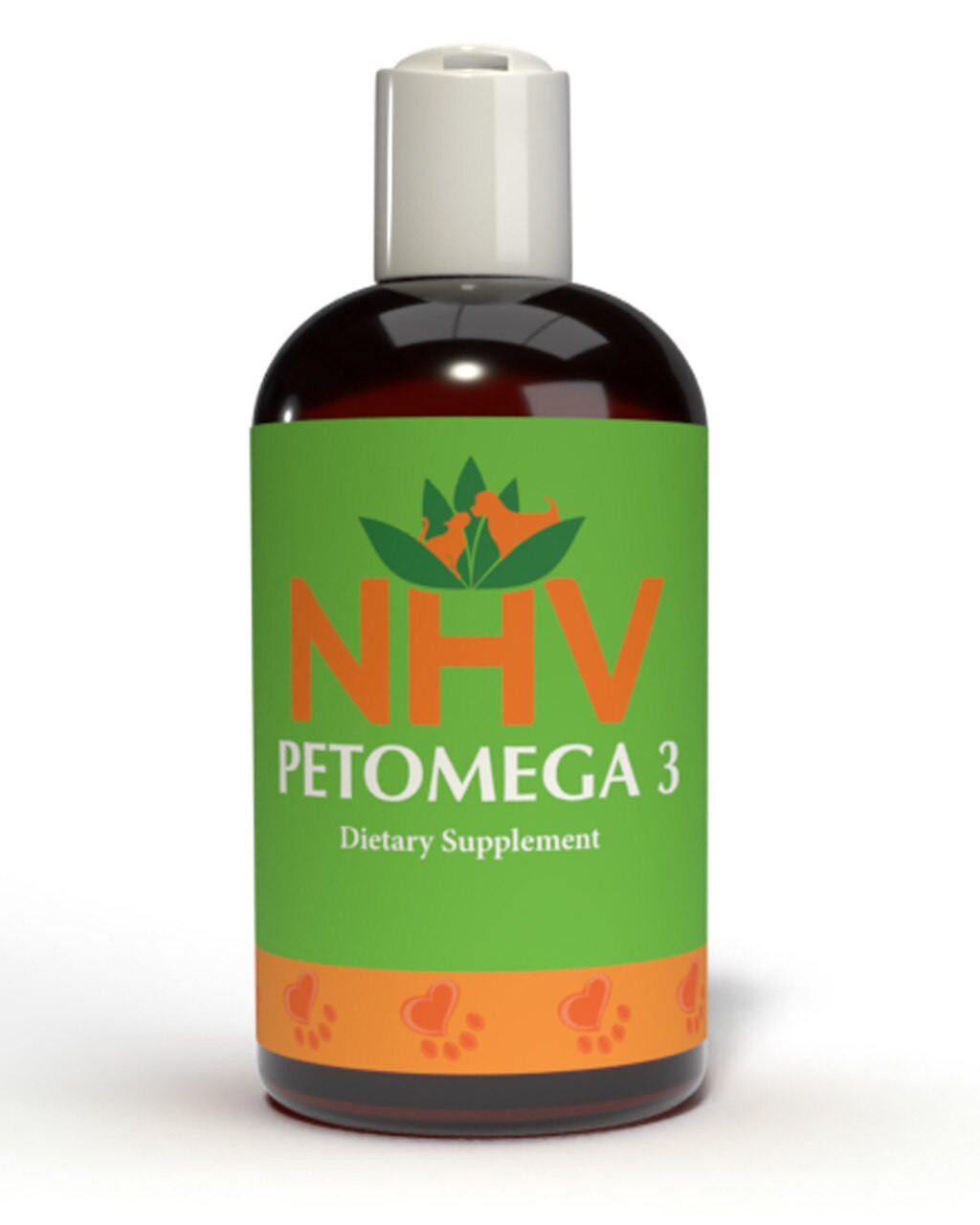
For Overall Health and Well-Being
buy 2 and save $3
Support your dog’s health with omega 3 fish oil for dogs. Help them maintain a healthy coat, eyes, joints, immune system and overall organ function.


Support your dog’s health with omega 3 fish oil for dogs. Help them maintain a healthy coat, eyes, joints, immune system and overall organ function.

Our omega 3 fish oil for dogs is a great source of EPA (Eicosapentaenoic Acid 600mg) and DHA (Docosahexaenoic acid 460mg) essential fatty acids. This fish oil supplement for dogs is derived from sardines, anchovies and North Atlantic cod liver oil. It is molecularly distilled and cold pressed to improve the bioavailability of the omega 3 fatty acids, and is medical and human grade quality.
Omega 3 fish oil for dogs may be beneficial for the following:
Processed pet foods have increased omega-6 fatty acids, and decreased omega-3 fatty acids. The University of Maryland Medical Center states, "It is very important to maintain a balance between omega-3 and omega-6 fatty acids in the diet. A proper balance helps maintain and even improve health." Your dog’s body cannot easily make essential fatty acids. It is vital to provide omega 3 fish oil for dogs as an added supplement to your pet’s daily diet.
The American Journal of Veterinary Medicine has published studies on the benefits of omega 3 fatty acids (fish oils) for arthritis and degenerative joint disease in dogs. The studies showed that dogs who were given omega 3 fatty acids had a significantly improved ability to get up from a resting position and marked improvement in walking ability.
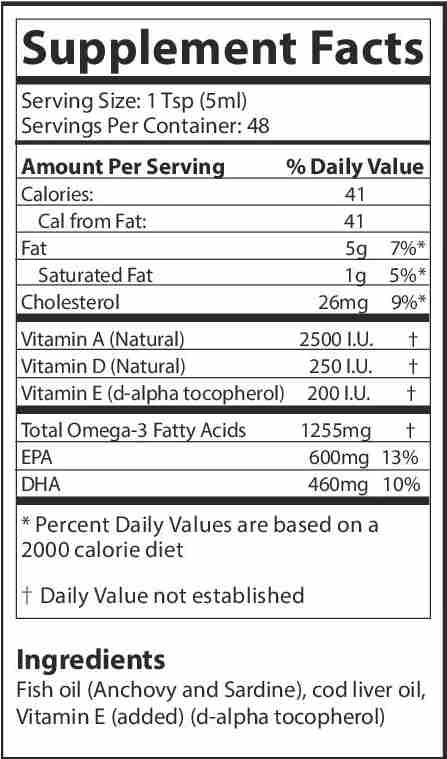
Suggested Dosage: To be taken once per day. Add to food based on weight chart.
Therapeutic Dosage: Double the quantity for maximum period of 4 weeks or follow veterinarian advise.
Pet’s Weight Dosage
0-15 lb = ¼ tsp
15-30 lb = ½ tsp
30-60 lb = 1 tsp
60-90 lb = 1 ½ tsp
How to Administer: Shake well before use. The easiest method is to add the dosage to your pets food. Some pets can be finicky, if this occurs consider hiding the appropriate amount in food most pet’s love such as fish, chicken, yogurt, or a favorite treat. If your pet only eats dry food then soak kibbles at feeding time.
For Best Results
Dietary supplements are beneficial to the health and well-being of your pet and are safe for long-term use. Every pet responds to natural supplements differently, therefore it is important to be consistent and administer the product daily. Supplements generally take two to four weeks to take effect, however this will vary from one animal to the next.
Product Storage
All NHV Natural Pet Products contain no artificial additives, preservatives or coloring. Shelf life after opening is 6 months and must be refrigerated after opening.
Cautions and Contraindications
Avoid During Pregnancy.
Our omega 3 fish oil for dogs is a great source of EPA (Eicosapentaenoic Acid 600mg) and DHA (Docosahexaenoic acid 460mg) essential fatty acids. This fish oil supplement for dogs is derived from sardines, anchovies and North Atlantic cod liver oil. It is molecularly distilled and cold pressed to improve the bioavailability of the omega 3 fatty acids, and is medical and human grade quality.
Omega 3 fish oil for dogs may be beneficial for the following:
Processed pet foods have increased omega-6 fatty acids, and decreased omega-3 fatty acids. The University of Maryland Medical Center states, "It is very important to maintain a balance between omega-3 and omega-6 fatty acids in the diet. A proper balance helps maintain and even improve health." Your dog’s body cannot easily make essential fatty acids. It is vital to provide omega 3 fish oil for dogs as an added supplement to your pet’s daily diet.
The American Journal of Veterinary Medicine has published studies on the benefits of omega 3 fatty acids (fish oils) for arthritis and degenerative joint disease in dogs. The studies showed that dogs who were given omega 3 fatty acids had a significantly improved ability to get up from a resting position and marked improvement in walking ability.

Suggested Dosage: To be taken once per day. Add to food based on weight chart.
Therapeutic Dosage: Double the quantity for maximum period of 4 weeks or follow veterinarian advise.
Pet’s Weight Dosage
0-15 lb = ¼ tsp
15-30 lb = ½ tsp
30-60 lb = 1 tsp
60-90 lb = 1 ½ tsp
How to Administer: Shake well before use. The easiest method is to add the dosage to your pets food. Some pets can be finicky, if this occurs consider hiding the appropriate amount in food most pet’s love such as fish, chicken, yogurt, or a favorite treat. If your pet only eats dry food then soak kibbles at feeding time.
For Best Results
Dietary supplements are beneficial to the health and well-being of your pet and are safe for long-term use. Every pet responds to natural supplements differently, therefore it is important to be consistent and administer the product daily. Supplements generally take two to four weeks to take effect, however this will vary from one animal to the next.
Product Storage
All NHV Natural Pet Products contain no artificial additives, preservatives or coloring. Shelf life after opening is 6 months and must be refrigerated after opening.
Cautions and Contraindications
Avoid During Pregnancy.
Published: April 11, 2024